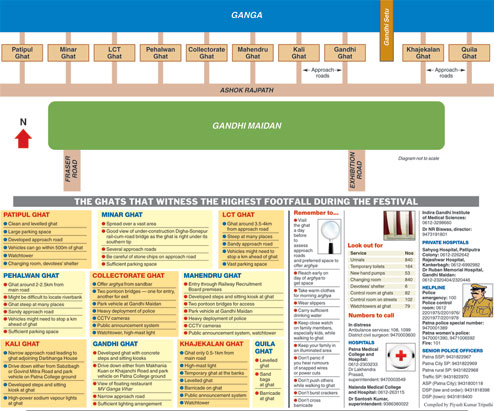 |
Cleanliness is the buzzword of the season.
Prime Minister Narendra Modi’s call for a Swachh Bharat and the Chhath festival have the same purpose — purity of soul.
Modi launched the Swachh Bharat Abhiyan across the country on October 2 to encourage cleanliness. Many leaders and celebrities joined in the drive to inspire others. In Bihar, Chhath automatically forces people to pledge for purity, discipline and cleanliness for four continuous days.
Chhath is unique because no formal ritual is performed and no priest is required. It is performed with the highest sense of devotion, with physical and mental purity. During the festival, there is a sea change in the city and everybody joins in devotion towards the Sun God with utmost sincerity, austerity and purity of purpose.
The Telegraph found some amazing factors that motivate people to clean the environment and what stops them from doing so round the year.
Sociologist Hetukar Jha said: “There is religion attached to the festival though there no mantras are chanted and no priest is required. But vested interests force people to go clean during the festival. More than that, it is fear among people and the belief that they would be rid of diseases and danger. However, on other days there is no such mechanism at work to motivate them to keep their surroundings clean.”
He added: “The idea of disposing of filth in the river started in the Raj era. They could have thought something better but by that time they had left India and the pattern of dumping filth continues till date. I appreciate the initiative taken by the Prime Minister and Bihar, I am sure, can set an example.”
Strong resolve marks Chhath, the festival of offering prayers to the Sun. After fasting on Kharna, the Chhath vratis (devotees) offer Pehli Arghya to the Sun. Different rituals and ceremonies are observed on all the days, keeping in mind every minute detail. Fasting without water starts after Kharna in the evening. The devotees break their fast after offering arghya to the rising sun the next day. Lot of restrictions have to be followed while observing the rituals.
Vikas Chandra (52), who has been working for the past 25 years and leading the Ganga Bachao Andolan, said: “It is considered a sensitive festival. People fear severe punishment if they commit any mistake. Though it is performed with a lot of devotion, I have strong reservations about it being observed only once a year. I can understand the common man not cleaning up because they are not used to such acts. But what about the civic bodies? Is it not their responsibility to clean the ghats and remove garbage from the river round the year?”
He added: “There is a penalty provision under the Environment Protection Act, 1986, which talks about the protection and improvement of human environment. Still, animal carcass and bodies are thrown into the river. We also have the Bihar Municipal Act, 1998, but the state government has failed to implement the set rules. If these were implemented strictly, life would have been easier for civic bodies and devotees. On normal days, people don’t care at all because they are not afraid of any punishment and they keep strewing.”
Though a Hindu festival, even women from the Muslim community come forward to play their part in cleaning up the ghats.
Mumtaz Jahan and her friends from the community are some who pick up the broom to rid Patna City’s ghats of dirt.
Ever since Mumtaz became the councillor of ward number 59 in Patna City in 2002, the Ghasiyari Gali resident has been religiously cleaning up the ghats ahead of Bihar’s biggest festival. However, the practice of cleaning the ghats remains a once-in-a-year tradition.
“I clean the ghat because I believe we can respect each other’s religion by participating in our festivals. Chhath is the best platform to send across such a message,” said Mumtaz.
Additional municipal commissioner (sanitation and planning) Shrisat Kapil Ashok believes if people continue with the practice of cleaning their surroundings round the year, half of PMC’s work would be automatically taken care of.
“I understand the extent of devotion people show towards the festival. There is a lot of sacrifice that goes into it but except during the festival very few think about civic issues. It is a fact that absence of natural ponds and encroachment on drainage have made things complicated for us. However, we are trying our best to present them a clean city,” he said.
Chief secretary Anjani Kumar Singh said participation of people in organising Chhath is almost nil nowadays. “Earlier, the involvement of government during Chhath was negligible. But these days, people are totally dependent on the government machinery. Everything from top to bottom is provided by the government,” he said.










